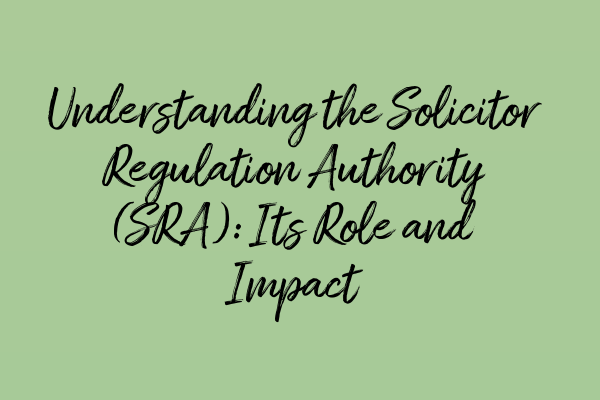Understanding the Solicitor Regulation Authority (SRA): Its Role and Impact
If you are interested in the legal profession or contemplating a career as a solicitor, it is essential to familiarize yourself with the Solicitor Regulation Authority (SRA). This regulatory body plays a vital role in ensuring the integrity and professionalism of solicitors in England and Wales. In this blog post, we will delve into the functions and impact of the SRA and explore its significance in the legal landscape.
What is the SRA?
The Solicitor Regulation Authority (SRA) is an independent regulatory body that regulates solicitors in England and Wales. It operates under the framework set out by the Legal Services Act 2007 and is responsible for maintaining high professional standards among solicitors to protect the public interest.
Role of the SRA
The primary role of the SRA is to regulate solicitors and law firms, ensuring they adhere to the regulatory obligations and rules set by the SRA Handbook. The SRA’s main objectives can be summarized into three key areas: protecting the public, promoting competition, and maintaining professional standards.
To protect the public, the SRA sets and enforces ethical standards for solicitors, ensuring they act in the best interest of their clients. The SRA investigates complaints against solicitors and takes appropriate disciplinary action when necessary, including issuing fines, imposing conditions on practicing certificates, and even striking off solicitors from the roll.
In promoting competition, the SRA aims to foster a diverse and competitive legal market. By regulating entry to the legal profession and monitoring the conduct of solicitors, the SRA ensures fair competition among law firms, enhancing access to justice for the public.
The SRA’s commitment to maintaining professional standards is crucial for the credibility and reputation of the legal profession. The SRA sets and enforces the Solicitors Qualifying Examination (SQE), which is a comprehensive assessment that aspiring solicitors must pass to become qualified. By upholding rigorous standards for qualification and ongoing Continuing Professional Development (CPD) requirements, the SRA ensures solicitors are competent and up-to-date with legal developments.
Impact of the SRA
The SRA has a significant impact on solicitors, law firms, and the legal profession as a whole. It serves as a benchmark for professional conduct, promoting a sense of accountability and professionalism among solicitors. By regularly reviewing and updating the SRA Handbook, the SRA keeps pace with the evolving legal landscape, enabling solicitors to provide legal services that align with current regulations and best practices.
The disciplinary actions taken by the SRA in response to misconduct allegations demonstrate its commitment to maintaining high ethical standards. This instills confidence in the public and ensures the integrity of the legal profession by weeding out unscrupulous practitioners.
Moreover, the SRA’s promotion of competition drives innovation and diversity within the legal market. It encourages law firms to provide high-quality services and innovative legal solutions to gain a competitive edge. This ultimately benefits clients by offering them a broader range of options and improved access to legal services.
Conclusion
In conclusion, the Solicitor Regulation Authority (SRA) plays a critical role in regulating solicitors and law firms in England and Wales. Its functions encompass protecting the public, promoting competition, and maintaining professional standards within the legal profession. By upholding ethical conduct, ensuring high professional standards, and fostering competition, the SRA contributes to the integrity and credibility of the legal profession. If you are interested in learning more about various legal aspects, we recommend checking out our related articles:
– Private Prosecutions: Exploring Non-Governmental Prosecutions in Criminal Cases
– Ethical Challenges in Criminal Defence: Navigating Dilemmas
– Understanding Drug-related Offences: Laws and Penalties in the UK
– Magistrates’ Court vs Crown Court: Different Paths in Criminal Proceedings
– Criminal Defence Strategies: Expert Approaches to Protecting Clients’ Interests
Feel free to explore these articles to expand your knowledge about various legal topics.


Leave a Reply